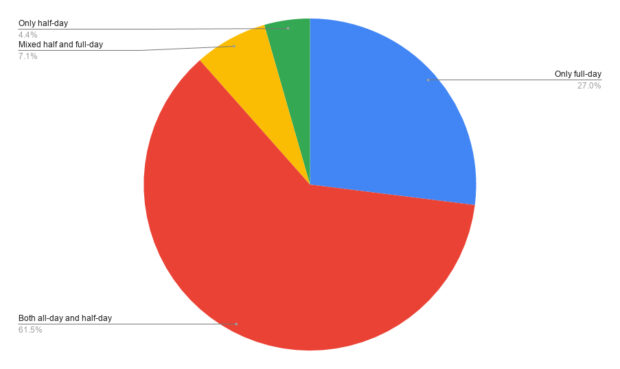Most Idaho districts and charters offer all-day kindergarten, even though the state provides no direct funding for it.
Rather, local school leaders secure funds through other means, including federal and local dollars.
Kindergarten is optional in Idaho, and students aren’t required to start school until age 7. Idaho lawmakers have regularly voted against funding all-day kindergarten — including this session, when House Bill 331 was voted down. The measure would have allocated up to $42.1 million for all-day kindergarten.
Still, some data and experts suggest that all-day kindergarten improves learning.
In 2010, a study by researchers at Duke University, the University of South Carolina and the University of North Carolina showed that children who attend full-day kindergarten had better academic outcomes in first grade, more self-confidence and were better at playing with others, the Hechinger Report noted in 2018.
Idaho Education News surveyed every school district and charter school in the state with elementary schools to determine which ones offer all-day kindergarten, and how they cover the cost. Out of 165 districts and charters that responded, 71 said they offer all-day kindergarten full time, while 56 more offer it on modified schedules, including some with four-day school weeks and others with shortened school days.
These results represent an increase from 2019, when a similar EdNews survey found that 97 of Idaho’s 156 districts and charters offered some form of all-day kindergarten.
About 21,140 students are enrolled in kindergarten this school year. Of those, 5,700 are in districts that offer only full-day kindergarten, while about 900 are in schools that don’t. The rest are in districts or charters with both full-day and half-day options.

Nampa School District has provided full-day kindergarten for students for two years. Teacher Terra Hyslop said having all the kindergartners every day has advantages, both academically and behaviorally.
Before moving to all-day kindergarten, lessons were crammed to help students meet academic standards, Hyslop said. Half-day students struggled to retain information, so teachers often repeated lessons.
Extra time provided through all-day offerings helps students build relationships with each other and with staff members, and streamlines her connection to students, Hyslop added. “We’re consistent now. They are seeing me every day. They’re hearing my rules every day. They’re seeing the other kiddos in the classroom every day.”
Districts and charters fund all-day kindergarten in unique ways
According to EdNews’ survey, 19 schools use general fund money to support all-day kindergarten. Seven others use a mixture of general funds and other sources, including funds from local supplemental levies, federal Title 1 dollars and private grants.
The rural Camas County School District offers full-day kindergarten every day with the help of a $20,688 federal rural school achievement grant supplemented by general fund dollars. With no daycare facilities in the area, the district is the only local childcare resource for parents.
Superintendent Janet Williamson said that Camas County hears regularly from locals who need more childcare options.
If the state funded all-day kinder, Williamson said, general fund dollars spent on kindergarten right now could go toward hiring another paraprofessional to help support in-class interventions, which “would be huge.”
Fourteen schools surveyed use local supplemental levy funds for all-day kindergarten. Nine others use money from a $1.5 million grant from the J.A. and Kathryn Albertson Family Foundation.
Five schools use state literacy dollars to fund all-day programs. The state’s literacy initiative has been running for four years, putting additional money into schools to boost reading scores for kindergarten through third graders.
Nampa’s program survives on a combination of $1.2 million in literacy dollars and about $180,000 in federal Title I funds.
Two Idaho school districts, Fremont County and Richfield, use a combination of literacy dollars and supplemental levy funds.
A few Idaho districts charge tuition for all-day kindergarten. For 17 years, West Ada has offered half-day kindergarten with a full-day tuition kindergarten as an option. Chief communications officer Char Jackson said the district has 2,367 kindergarten students, with about 700 attending tuition kindergarten. The program is available at 24 of the district’s elementary schools this year. Tuition kindergarten is $270 per month in West Ada.
Boise School District also has a tuition model for full-day kindergarten, where families pay $250 per month. The fee drops to $150 per month for families who qualify for federal reduced- price meals, and it’s free to families who qualify for free meals.
According to district spokesman Dan Hollar, Boise School District plans to use $426,000 from the district’s general fund to run full-day kindergarten next year.
Boise currently has 990 students in half-day kindergarten, with 438 in full-day kindergarten.
North Star Charter, Rolling Hills Charter and White Pine Charter also charge tuition for full-day kindergarten.
EdNews data analyst Randy Schrader contributed to this story.
Disclaimer: Idaho Education News is funded on a grant from the J.A. and Kathryn Albertson Family Foundation.
